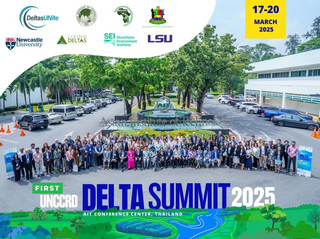From March 17th to 20th, 2025, for the first time the International Delta Summit DeltasUNite with a United Nations Convention on Conserving River Deltas (UNCCRD) took place and was held at the conference centre of the Asian Institute of Technology in Bangkok (Thailand). The meeting formed the basis to elaborate and deliver a White Paper to the United Nations to make operational a UN Convention for Conserving River Deltas (UNCCRD), which was unveiled and approved at COP28. More than 500 million people live in the world’s deltas that face accelerating risks due to climate change, relative sea-level rise, the impact of various hazards, environmental degradation, pollution and unsustainable development. The impact of these threats on the delta’s population and environment are immense and challenge human and ecosystem health, biodiversity, food security and livelihoods. Consequently, closer collaboration between governmental and academic institutions, the United Nations, multilateral development banks, organisations acting on international, national and local level, public and private sector, and delta communities is required to tackle those challenges and find solutions to safeguard present and future existence of the river deltas. To achieve global discourse and collaboration, inclusive governance, policy development and targeted interventions, the UNCCRD follows a bottom-up approach and seeks for an equitable dialogue between all stakeholders, including community representatives, youth, academia, governmental and non-governmental organisations.
I had the pleasure to contribute to this summit by giving a talk on How to evaluate flood hazards and relative sea-level rise impact in data-sparse coastal lowlands?, thereby highlighting (i) what needs to be considered when conducting hazard assessments in the world’s low-lying deltas (e.g. how to properly handle elevation data), (ii) which workflows, using existing open data properly, can be used for integrative flood hazard assessment to inform decision making and risk mitigation and adaptation strategies, and how to use these workflows, and (iii), emphasizing the need of making high-quality, local data available for scientific research in order to strengthen first-order hazard and impact assessments. Besides presenting, I had the pleasure to exchange with various attendees and colleagues, further extending my network, also more beyond the scientific one. Actively engaging in discussions, debates, and brainstorming chats about different topics around the world’s deltas, challenges and potential solutions, and the White Paper, was a great opportunity to provide input for the co-created draft of the White Paper document. Seeing how all the joint efforts around the summit contribute to set up the UNCCRD, makes me very happy and I am very grateful to have had the honour and privilege to be part of. I am very thankful to everyone who contributed to this First UNCCRD Delta Summit and I am looking forward to the next steps in the formation of the UNCCRD initiative. My sincere thanks also to the Graduate School of Geosciences (GSGS) at the University of Cologne for awarding me the GSGS Training and Networking Grant to attend and present at the First UNCCRD Delta Summit.
Katharina Seeger
PhD candidate
Institute of Geography
PhD project: Rising sea and sinking land: Determining spatially resolved subsidence rates for the Ayeyarwady Delta (Myanmar) and developing dynamic adaptation scenarios for the increased risk of flooding (Follow-up project of the project Driving factors for and societal effects of sea-level rise and delta flooding in the Ayeyarwady Delta (Myanmar) – Lessons from the past for disaster governance in the future)
Presentation title (Oral): How to evaluate flood hazards and relative sea-level rise impact in data-sparse coastal lowlands? Open data is key!
